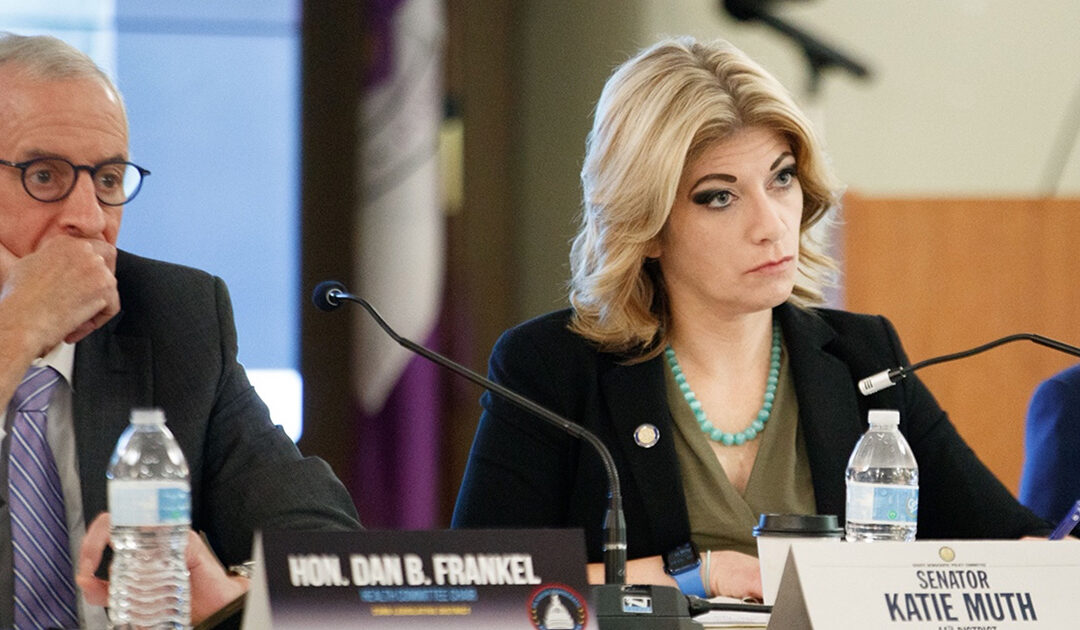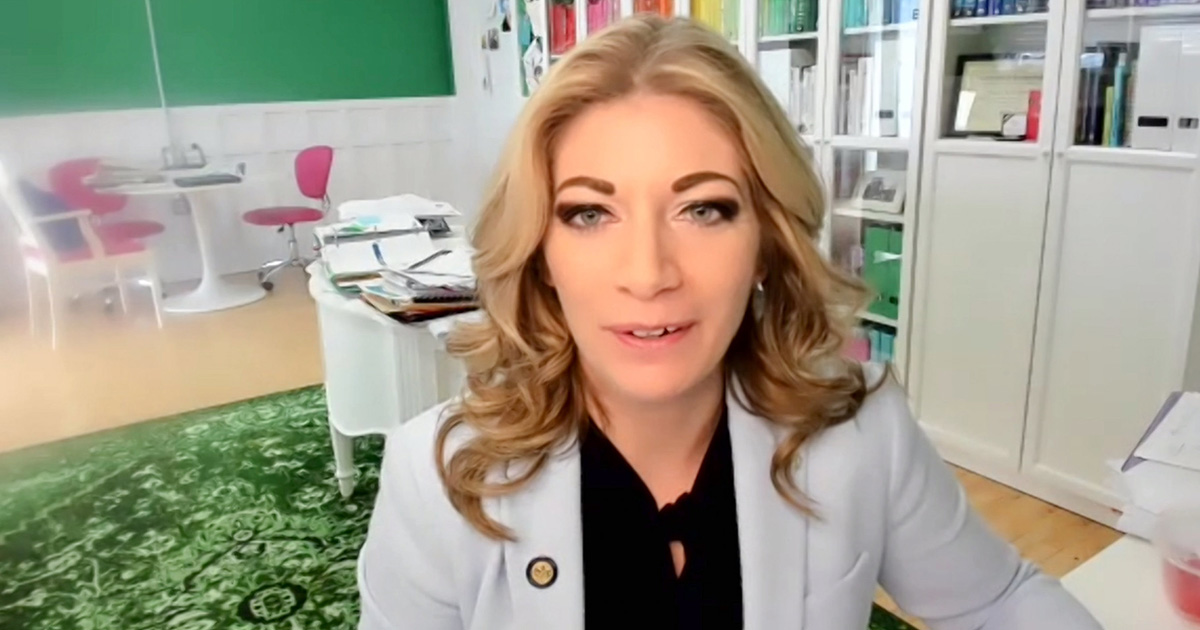Harrisburg - 11 de febrero 2021 - Ayer, a petición de los presidentes del Caucus de Salud de la Mujer PA Sen. Judy Schwank (D- Berks), Sen. Amanda Cappelletti (D- Delaware / Montgomery), Rep. Mary Jo Daley (D- Montgomery), y Rep. Morgan Cephas (D- Filadelfia), el Comité de Política Democrática del Senado de Pensilvania se unió al Comité de Política Democrática de la Cámara celebró una audiencia pública virtual para discutir la salud materna en medio de COVID-19.
"Desde el comienzo de esta pandemia, he estado profundamente preocupada por la salud tanto física como mental de las madres y las familias que experimentan el parto y el cuidado de los bebés a la sombra de COVID-19", dijo Schwank. "Debemos asegurarnos de que las madres y los bebés reciben la mejor atención posible y reciben el apoyo y los servicios que necesitan para mantener una vida sana durante y después de esta pandemia".
Las mujeres, especialmente las de color, han sido las más perjudicadas por esta pandemia. No sólo deben velar por su propia salud y seguridad, sino que a menudo son las principales cuidadoras y proveedoras de sus hijos y familiares. Mientras debatimos todos los aspectos de la atención sanitaria y el impacto que el COVID-19 ha tenido en las mujeres, debemos asegurarnos de que la salud de las mujeres y la salud de sus hijos no se queden fuera de esta conversación."
El Dr. Richard Beigi, ginecólogo-obstetra y presidente del UPMC Magee-Women's Hospital, habló de las muchas preocupaciones que han tenido las mujeres embarazadas sobre la posibilidad de recibir la vacuna COVID-19, ya que las mujeres embarazadas no estaban incluidas específicamente en los ensayos clínicos. Afirmó que es partidario de incluir a las mujeres en los ensayos clínicos desde el principio.
"No hay motivos para pensar que estas vacunas sean perjudiciales para las embarazadas o sus bebés", afirmó el Dr. Beigi. Afirmó que, aunque no ha visto pruebas para no vacunar a las embarazadas, las que decidan no vacunarse durante el embarazo deben seguir recibiendo pleno apoyo en su decisión informada.
Durante su testimonio, la Dra. Elizabeth Morgan, especialista en salud materno-fetal de Baystate Health en Massachusetts, también habló sobre la inclusión de las mujeres en los ensayos clínicos porque, "...excluir a las mujeres de los ensayos de vacunas durante una pandemia mundial es realmente una experimentación en sí misma cuando sabemos que corren un alto riesgo de contraer la enfermedad".
La Dra. Catharine I. Paules, profesora adjunta de enfermedades infecciosas en la Facultad de Medicina y Salud de Penn State, ha trabajado en el Instituto Nacional de Salud con el Dr. Anthony Fauci y actualmente está embarazada. Contó que decidió ponerse la vacuna de Pfizer contra la COVID-19 cuando su embarazo estaba a término, y después de leer la literatura médica del Reino Unido sobre la variante de la COVID-19 que, anecdóticamente, tenía efectos más graves en las mujeres embarazadas de ese país.
El Dr. Morgan compartió que Baystate Health en conjunto con la Facultad de Medicina de la Universidad de Massachusetts, ha producido documentos en 10 idiomas diferentes para ayudar a las mujeres embarazadas que están tomando la decisión de vacunarse contra la COVID-19, y esa información se ha descargado más de 35.000 veces. También declaró que COVID-19 ha tenido otros determinantes importantes para la salud, como los bajos ingresos, la inseguridad alimentaria y de vivienda y el hacinamiento, entre otros factores.
"El hecho de que estemos en 2021 y las mujeres de color sigan teniendo tres veces más probabilidades de morir al dar a luz que otras mujeres es inaceptable", dijo el diputado Cephas. "El acceso a una atención de calidad y asequible nunca debería basarse en el color de la piel o el código postal, y la pandemia de COVID-19 solo ha empeorado estas disparidades. Ahora debemos tomar lo que hemos discutido en la audiencia de hoy y convertirlo en reformas sustanciales que reduce mejora los resultados de salud materna en toda la Commonwealth."
La Dra. Sindhu K. Srinivas, Directora de Servicios Obstétricos del Hospital de la Universidad de Pensilvania, declaró: "Soy una de las muchas personas que se encuentran en primera línea de la crisis de morbilidad y mortalidad maternas y estoy profundamente preocupada por el aumento de las tasas de morbilidad y mortalidad y las disparidades asociadas."
La Dra. Srinivas afirmó que la crisis de la COVID-19 ha acelerado su trabajo y el de sus colegas para poner en marcha programas piloto fuera de Penn Medicine que ayuden a las mujeres inmediatamente después de dar a luz y volver a casa con sus bebés. Señaló que el 50% de la morbilidad y mortalidad maternas se producen en este periodo.
Aumentar el acceso a Internet de banda ancha, incrementar la alfabetización digital, garantizar que los recursos tecnológicos estén disponibles en varios idiomas y asegurarse de que la telesalud sea reembolsable por las compañías de seguros y Medicaid son aspectos esenciales para seguir creando programas que aumenten la paridad y disminuyan la morbimortalidad materna, afirmó el Dr. Srinivas.
Los datos han demostrado que en Estados Unidos se producen cada año unas 700 muertes relacionadas con el embarazo, y tres de cada cinco de ellas son evitables. Mientras las tasas de mortalidad materna disminuyen en otros países en desarrollo, en Estados Unidos aumentan.
"Los protocolos de distanciamiento social de la sanidad pública puestos en marcha durante la pandemia también han aumentado el aislamiento social. Esto ha dejado a las nuevas madres sin apoyo social, interacciones sociales y ayuda con el cuidado de los niños", afirmó la Dra. Rhonda C. Boyd, psicóloga del Departamento de Psiquiatría y Ciencias del Comportamiento Infantil y Adolescente del Hospital Infantil de Filadelfia. "Las mujeres perinatales de color, especialmente las madres negras, latinas e indígenas, también se ven afectadas de forma desproporcionada por el hecho de que sus familiares contraigan el COVID-19 o mueran a causa de él. Es comprensible que esta situación provoque un aumento del estrés, la preocupación y el dolor."
"El impacto de esta pandemia en las mujeres con familias jóvenes no se puede medir, sin embargo, con un acceso ya limitado a la asistencia sanitaria de alta calidad, especialmente para las personas embarazadas de color, debemos medir el impacto para encontrar maneras de aumentar la atención ahora y en el futuro", dijo el representante Daley.
Demia Horsley, Directora de Iniciativas Estratégicas de Healthy Start, Inc. de Pittsburgh, señaló la importancia de las doulas en la experiencia del parto y posparto de muchas madres. Horsley dijo que las restricciones pandémicas que permiten que sólo una persona esté con una mujer durante el parto pueden ser perjudiciales para la salud de la mujer durante y después del parto. Horsley afirmó que una pareja puede no ser el mejor defensor de una mujer durante el proceso de parto y posparto, y que aumentar el acceso a los servicios de doulas para las mujeres prenatales, de parto y posparto generará mejores resultados en la mortalidad materna y en el tratamiento temprano y eficaz de la depresión posparto.
"Estoy muy agradecido de que hemos sido capaces de reunir el Caucus de Salud de la Mujer PA, junto con nuestros colegas en la Cámara, para discutir los impactos de COVID-19 en la salud de las mujeres ahora, y el impacto que esto tendrá en el sistema de salud en los próximos años", dijo el senador Katie Muth (D- Berks, Chester, Montgomery), presidente del Comité de Política Demócrata del Senado. "Estas conversaciones y recomendaciones son esenciales para elaborar las políticas que protegerán las vidas de las madres y los bebés".
"Dar voz a la salud de las mujeres y a las desigualdades entre las mujeres de color es extremadamente importante y estoy encantado de que mis colegas estén manteniendo estas conversaciones. Las preocupaciones pueden parecer rutinarias para los profesionales de la medicina, pero para las mujeres es un juego completamente nuevo y debemos asegurarnos de que sean escuchadas", dijo el representante Ryan Bizzarro, presidente del Comité de Política Demócrata de la Cámara de Representantes.
Entre los senadores que asistieron se encontraban el líder demócrata Jay Costa (demócrata de Allegheny), Nikil Saval (demócrata de Filadelfia), John Kane (demócrata de Chester/Delaware), Wayne Fontana (demócrata de Allegheny), Lindsey Williams (demócrata de Allegheny), Sharif Street (demócrata de Filadelfia) y Tim Kearney (demócrata de Chester/Delaware).
Representantes de la Cámara que asistieron a esta audiencia incluyen Bridget Kosierowski (D- Lackawanna), Joe Webster (D- Montgomery), Melissa Shusterman (D- Chester/Montgomery), Mike Schlossberg (D- Lehigh), Elizabeth Fiedler (D- Philadelphia), Pam DeLissio (D- Montgomery/Philadelphia), Perry Warren (D- Bucks), Kyle Mullins (D- Lackawanna), Ben Sanchez (D- Montgomery), Pam Snyder (D- Greene/Fayette County/Washington), Mike Zabel (Delaware), Regina Young (D- Philadelphia County/Delaware), Joe Hohenstein (D- Philadelphia), Carol Hill-Evans (D- York), Dan Frankel (D- Allegheny), y Summer Lee (D- Allegheny).
A continuación figuran todos los que han testificado en la audiencia de hoy:
- Dr. Mark Woodland, M.S., M.D., FACOG, Presidente y Profesor Clínico de Obstetricia y Ginecología, Reading Hospital/Tower Health, Presidente Académico Interino de Obstetricia y Ginecología Drexel University College of Medicine
- Dr. Hyagriv "Hy" Simhan, UPMC Magee-Women's Hospital, Jefe de División de Medicina Materno Fetal
- Dr. Richard Beigi, UPMC Magee-Women's Hospital, Presidente, OB-GYN'
- Dr. Aasta Mehta, M.D., M.P.P., FACOG - Philadelphia MMRC, Philadelphia Dept of Health, PA MMRC
- Dr. Sindhu K. Srinivas , M.D., MSCE, Director de Servicios Obstétricos en el Hospital de la Universidad de Pensilvania, Vicepresidente de Calidad y Seguridad, Médico Jefe, Línea de Servicio de Salud de la Mujer, Penn Medicine
- Nicole Chaney, enfermera obstétrica titulada, Reading Hospital
- Markita Glenn, Doula, Fundación Pettaway Pursuit
- Dra. Elizabeth Morgan, especialista en salud materno-fetal, Baystate Health
- Dr. Richard S. Legro, M.D., Presidente, Departamento de Obstetricia y Ginecología, Profesor de Obstetricia y Ginecología y Ciencias de la Salud Pública, Penn State Health College of Medicine y Penn State Health
- Dra. Catharine I. Paules, M.D., Profesora Adjunta, Enfermedades Infecciosas, Penn State Health College of Medicine y Penn State Health
- Dra. Rhonda C. Boyd, Doctora en Psicología del Departamento de Psiquiatría Infantil y Adolescente y Ciencias del Comportamiento del Hospital Infantil de Filadelfia.
- Demia Horsley, M.P.H., CLC (DONA), LCCE, Directora de Iniciativas Estratégicas, Healthy Start, Inc.
La grabación completa de esta audiencia puede consultarse en senatormuth.com/policy.
###


